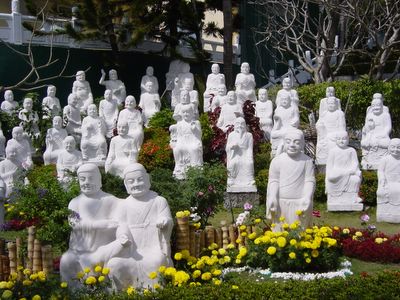New Years gatherings are done with and that's a relief. It's my thing with crowds, not unlike public days at the monastery, actually. It's definitely an issue I'll have to confront back at the monastery.
My 30-day visitors visa expires next Friday, and I have to decide soon whether to renew it by leaving the country before then, or just returning to the States and getting back to the monastery. It's starting to get distracting being away from the monastery and I'm starting to understand the concept of "protection of the Sangha". In my case, it would be protection from certain family members who don't know what monastic practice is, don't care to know what it is, and do their best to distract me from the practice. They're trying to catch a fish by throwing paper at the water.
With the smoke from all the extended-family gatherings clearing, I was able to take a solo day trip to a large monastery nearby, called Fo Guang Shan:
Great Buddha Land:

Main Shrine:

Arhat Garden:

Fo Guang Shan is a large temple complex with international branches. It's a very public place with lots of families milling about like they were in a park. In fact, aside from the many Buddha images and shrines, and the smattering of monastics among the populace going about their business, it was pretty much a park. If I knew the language and talked to monastics, I could have learned more about their practice, but as it was, I spent the entire day walking around the grounds, which even includes a museum, and was never at a loss for where to explore next. There were quite a few shops and vendors, too, which added to the park feel. No money changers, though, so if the Buddha were there, he wouldn't have gone on a rampage.
I kept an open mind about the place, and at the end of the day had more of an appreciation for Chinese Buddhism. I think now that there's no contradiction with it's practical and worldly focus. In ways it makes sense - we live in a practical world. We live in a world, of course it's "worldly". I understand it if they say it makes no sense to deny the worldly aspect of being, focusing just on the spiritual. Mainstream Chinese Buddhism might be emphasizing a balance. Or was that obvious and I'm just figuring it out now?

No comments:
Post a Comment